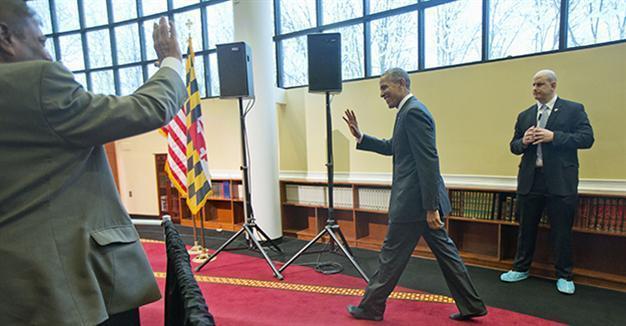Obama decries anti-Muslim rhetoric on first mosque visit
BALTIMORE - Agence France-Presse

President Barack Obama walks in his socks towards the podium before speaking to members of the Muslim-American community at the Islamic Society of Baltimore, Wednesday, Feb. 3, 2016, in Baltimore, Md. AP Photo
Barack Obama offered an impassioned rebuttal of "inexcusable" Republican election rhetoric against Muslims on Feb. 3, on his first trip to an American mosque since becoming president seven years ago.
Obama, whose grandfather converted to Islam, made the short trip to the Islamic Society of Baltimore to call on Americans not to be "bystanders to bigotry."
Invoking the Prophet Mohammed and hailing the tolerance shown by American political icons from Thomas Jefferson to Dwight Eisenhower, Obama hit out at anti-Islamic sentiment that is "not who we are."
"We've heard inexcusable political rhetoric against Muslim-Americans that has no place in our country," he said, lauding Muslim-Americans as sports heroes, entrepreneurs and the architect who fashioned Chicago's dizzying skyline.
His comments came as a shrill election debate has sullied America's image abroad, and as jihadist attacks in San Bernardino and Philadelphia threatened to shatter post-9/11 religious solidarity at home.
Six days after the 2001 attacks in New York and Washington, then president George W. Bush visited the Islamic Center of Washington, declaring "Islam is peace."
Today, Republican presidential candidate Donald Trump has wooed conservative voters by demanding a ban on Muslim immigrants, while frontrunner Ted Cruz has advocated Christian-only admissions and championed "Judeo-Christian values."
Obama took on such comments, and asked Christians to see "an attack on one faith is an attack on all our faiths."
He also criticized the media and Hollywood, which he said portrayed Muslims in a narrow way.
"Our television shows should have Muslim characters that are unrelated to national security," he said.
Obama has visited mosques in Malaysia, Indonesia and Egypt as president, but this was his first visit to one of America's 2,000-plus places of Islamic worship.
In 2009, a freshly elected Obama traveled to Cairo to call for a "new beginning" with the Muslim world.
Much of Obama's foreign policy agenda has focused on improving ties with Muslim nations, from making a nuclear deal with Iran to ending wars in Iraq and Afghanistan.
But the effort has been stymied by continued confrontation with jihadist groups and military strikes in Afghanistan, Iraq, Libya, Pakistan, Somalia, Syria and Yemen.
Obama restated his case that organizations like the Islamic State of Iraq and the Levant (ISIL) pervert Islam and do not represent the vast majority of Muslims.
The president offered "two words that Muslim-Americans don't hear often enough, and that is 'thank you'."
But he also called on Muslims to help tackle radicalization.
"How do we defend ourselves against organizations that are bent on killing innocents?" he asked.
"It can't be the work of any one faith alone. It can't be just a burden on the Muslim community, although the Muslim community has to play a role."
That message is a vexed one for members of the Muslim community, including audience member Riham Osman, who works for the Muslim Public Affairs Council, an advocacy group.
"I know national security will come up in the speech just because of the climate of today," she said ahead of Obama's remarks.
"It does upset me a little bit that it is his first time coming to visit a mosque, and there will be kids there who have grown up in this post 9/11 era and their faith is constantly linked to national security and extremism."
Around 49 percent of all Americans think "at least some" US Muslims hold anti-American sentiments, according to a Pew Research Center poll released on Feb. 3.
The United States is home to around 3.3 million Muslims.
Around 81 Muslim-Americans were involved in violent extremist plots in 2015, according to the Triangle Center on Terrorism and Homeland Security.
